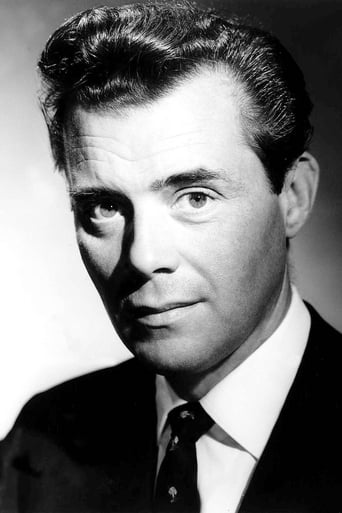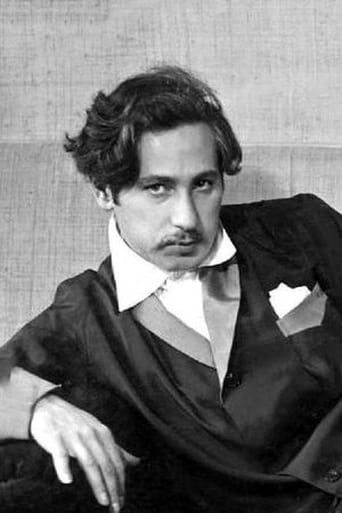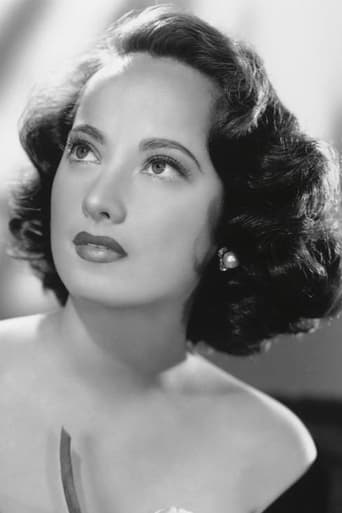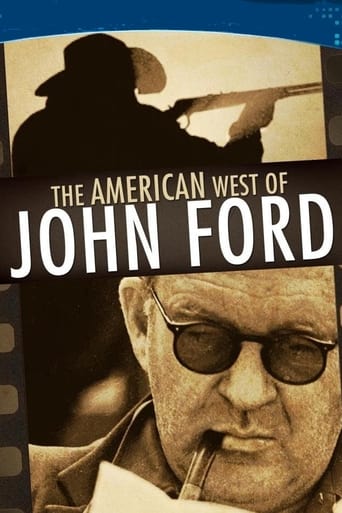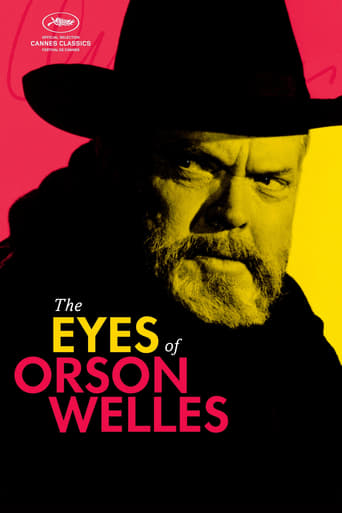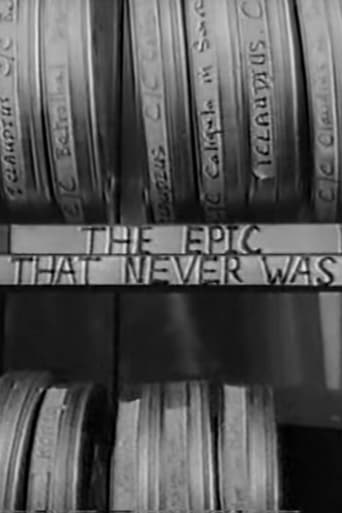

The Epic That Never Was (1969)
The story of the aborted 1937 filming of "I, Claudius", starring Charles Laughton, with all of its surviving footage.
Watch Trailer
Cast


Similar titles
Reviews
Excellent but underrated film
This is one of the best movies I’ve seen in a very long time. You have to go and see this on the big screen.
The acting is good, and the firecracker script has some excellent ideas.
By the time the dramatic fireworks start popping off, each one feels earned.
Although I adore the wonderful British mini-series, "I, Claudius", I had no idea that decades earlier there was a movie version in the works...a movie project that never was completed. I am actually thankful for that, as a film never could have adequately captured Robert Graves' two novels about the early Roman emperors....plus, perhaps if the film HAD been made, the mini-series never would have been made.In this made for television documentary, the great British actor Dirk Bogarde not only talks about this aborted film but introduces many surviving members of the cast to talk about the film (including, among others, Josef von Sternberg, Merle Oberon, Flora Robson, Robert Graves and Emlyn Williams). Additionally, much of the existing scenes from the film are shown. And, through seeing them, you can only assume that the makers of the mini-series must have watched these clips and used them in writing this....some are nearly word-for-word...and some aren't even close (such as Messalina's reaction when she meets Claudius).This is a marvelous film...but one that folks who never saw the mini-series or read the books would not enjoy. But for fans, it is an absolute must-see and an extremely interesting television documentary.
"Clash of the Titans" has two things in common with "I, Claudius": two actresses who played the role of Roman empress Livia. Sian Phillips looked like a young Livia from the BBC production of Robert Graves' novel, playing a Greek queen, while Flora Robson from the unfortunate, uncompleted version had a cameo as a soft-spoken witch. Corruption in the courts of the ancient world were common place no matter what part of the world they were from, it was all the same. Poison was queen, figs could be dangerous when ripe, and fifteen year old girls could be insatiable nymphomaniacs. Such is the ancient world. Such was the renaissance world, and such is the modern world. The Alexander Korda production directed by Joseph von Sternberg never made it to completion, and this fabulous documentary explains why. What was filmed is presented, and four of the major characters are seen here: Charles Laughton's Claudius, Emlyn Williams' Caligula, Flora Robson's Livia and Merle Oberon's Messalina. So where are Tiberius, Antonia, Serjanus and Nero (among others)? Unseen here, either cut out of the final script or not yet cast or filmed most likely. What is here is a profile of British filmmaking, often overshadowed by Hollywood. Laughton's inability to find his character (although he had already played Claudius's adopted son/great nephew Nero), other principal casting, and ultimately Oberon's accident. What remains gives a glimpse into the four characters who made the later T.V. mini-series. Laughton, Williams and Robson are letter perfect in their parts, but Oberon is obviously wrong for the role of a teenaged girl. Dirk Bogarde adds class as the narrator with the surviving actors determined to share their experiences. This is a must, especially if you have just seen the T.V. production.
This is one of the most famous documentaries about one of the most legendary aborted projects in film history. The reasons for the latter were two-fold: definitively by way of a car accident in which leading lady Merle Oberon was injured but, firstly, due to star Charles Laughton's difficulty in "finding the man". There is some heart-breaking evidence here of out-takes in which he flubs his lines and demands pardon of his colleagues: in hindsight, having played so many historical characters – including another Roman Emperor, Nero, in Cecil B. De Mille's THE SIGN OF THE CROSS [1932] – and figures of authority throughout the decade (constituting some of the greatest performances on record), one can hardly fault him for failing to strike the necessary balance at first...since he later reportedly drew inspiration from then-recent British events i.e. the abdication of King Edward VIII! With respect to Claudius' physical liabilities, too, Laughton would be vindicated a hundred times over in a couple of years' time with his magnificently poignant Quasimodo in the definitive screen rendition of THE HUNCHBACK OF NOTRE DAME.Anyway, luckily for us, this documentary presents all the surviving footage (which is quite brilliant and, frankly, ahead of its time – making the loss all the more regrettable). The film was intended as producer Alexander Korda's ultimate achievement, for which he even imported one of Hollywood's most idiosyncratic directors – Josef von Sternberg. Unfortunately, at this juncture, the latter is played up as the villain of the piece (perhaps because his arrogance is well-documented) – being taken to task especially when he blames the cancellation of the film on actors' 'tantrums'. Oberon herself does not mention this fact, but seems to accept the project's dissolution as a "godsend". However, another principal actor, Emlyn Williams (who, by the way, makes for a marvelously wily Caligula) ridicules his non-existent aristocratic pretensions...while costume designer John Armstrong berates Sternberg over his deliberate disregard for authenticity! I do feel that double standards were applied in this case – as many a star's foibles have been tolerated over the years but a director, apparently, cannot avail of that luxury (especially when vast sums of money are involved)! The documentary (occasionally accompanied by the powerful strains of Richard Strauss' "Thus Spake Zarathustra" a year before it was to be immortalized thanks to Stanley Kubrick's 2001: A SPACE ODYSSEY!) is hosted by Dirk Bogarde who, interestingly enough, narrates of how he had gone on the set as a curious teen. Also on hand to recount the debacle are actress Dame Flora Robson (playing much older than her age as Claudius' mother), the director's script-girl (who, at least, praises Sternberg for his editorial sense), Robert Graves – the author of the two novels on which the script were based, but whose own adaptation had been rejected! – and, of course, Sternberg himself who believes the results would have been great but, in retrospect, having already made his mark on the cinema, his career thereafter would presumably not have been much different (that said, it did go kind of downhill from there – with the 1940s being especially slack for him – though it took another 16 years to fully peter out!). For the record, Korda, Laughton and supporting actor Robert Newton had all passed on by the time this documentary came to be made.Eventually, the novels would be turned into a massive but celebrated TV series in 1976 with Derek Jacobi as Claudius and John Hurt as Caligula. I own it on 2 DVDs, but the 11-hour length was daunting and I could not possibly fit it in my current Sternberg schedule (as was the case with THE ADVENTURES OF ROBINSON CRUSOE [1964] during the Luis Bunuel retrospective). Maybe next month will be different, seeing how the usually epic-centered Easter period is just around the corner...
A look at never completed version of I, Claudius. This is a wonderful look at film making in the golden age, both as it was and as memory has made it. We get to see the stars and crew talk about a project that got away and how it still haunts them. This is one of the best films on films ever made, partly because it shows us what might have been a treasure, but also because it does what what movies do best, create an illusion of something that doesn't really exist. With a film like this, made decades after events, the mind is left to ponder what the aborted film might have been. From the few scraps of actual footage we expand it out to a completed film that might have been one of the greatest films of all time. Of course it all could have gone south as well, but the fun is in what might have been.... 10 out of 10A Personal request- would someone please put this out on DVD by itself, its stupid to make us buy the BBC miniseries just to be able to see this.


